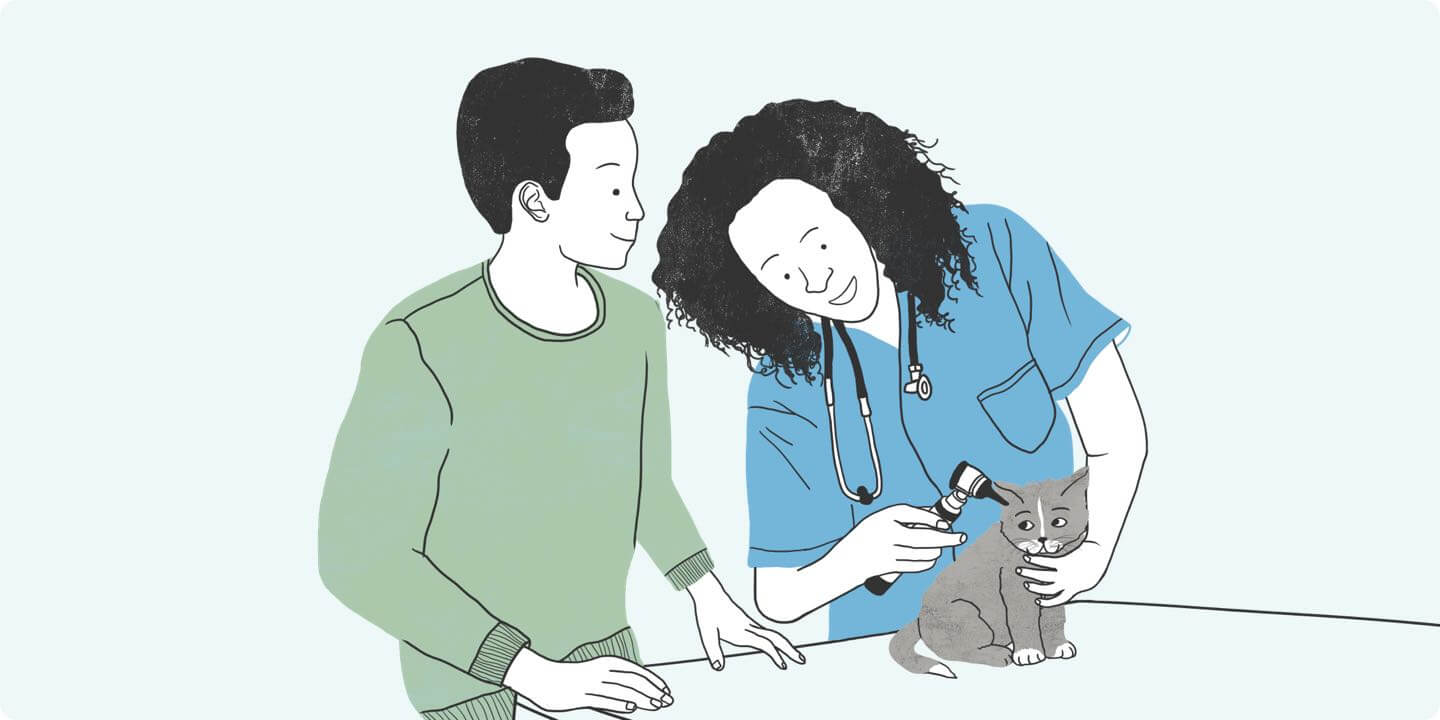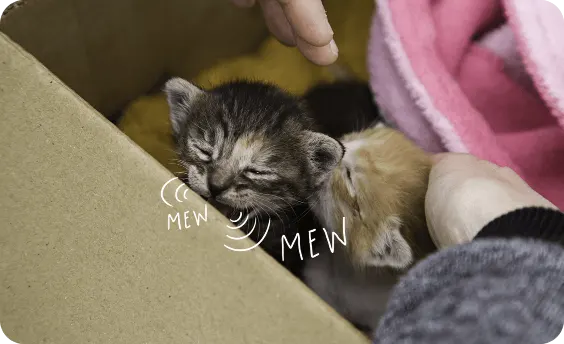Kitten season is here! During late spring to summer, kitten birth rates are the highest of the year. Mother cats (called “Queens”) go into heat soon after the winter solstice as the weather warms and the days get longer. While kittens are cute and cuddly, they’re in danger of contracting numerous diseases.
Kittens are at a higher risk of getting certain parasites and diseases until their immune system develops and they begin to receive preventative medications and series of kitten shots (vaccines) from their veterinarian. Every kitten is different, so talk with your vet to determine which parasite preventatives and vaccinations will best help protect your kitten.
Common Parasites Found in Kittens
Fleas
While annoyance and itch are the most common side effects from fleas, a heavy infestation can lead to potentially fatal anemia in kittens[1]. Getting rid of fleas can be frustrating, costly, and time-consuming, so prevention is key. Your veterinarian will determine a safe age for your kitten to begin taking flea medication.
To help prevent your kitten from getting fleas:
- Check them over daily with a flea comb
- Ensure that all pets in your home are on flea preventatives (yes, even indoor-only pets)
- Vacuum all flooring (including carpets and hardwood floors) and furniture
- Wash bedding in hot water regularly (this may need to be done daily if there’s already an infestation, as immature fleas that live in the home environment can develop quickly)
Intestinal Worms
A kitten’s immune system is not as strong as that of a full-grown cat, which means they’re more likely to get intestinal worms. These worms can grow throughout the intestines and can cause symptoms ranging from stomach swelling to vomiting, diarrhea, dehydration, or a failure to thrive.
Roundworms are the most common type of intestinal worm of cats, as almost all cats get them at some point in their lives, usually as kittens. They can even get these worms from their mother during feeding[2].
Hookworms are another type of intestinal worm that attach to the lining of a cat’s intestinal wall, feed on a cat’s blood, and pass eggs in a cat’s feces[2]. They can cause anemia, diarrhea, and weight loss in kittens. Large numbers of these hookworms can be fatal[3]. Kittens should be dewormed according to a schedule set by your veterinarian, usually every two weeks beginning at 2 through 8 weeks of age when they are able to go on a preventative medication that protects against worms.
Ear Mites
These creepy-crawlies can infest your kitten’s ears and cause them all sorts of suffering. Ear mites occur more often in cats less than one year of age. Signs of ear mites include shaking of the head, scratching at the ears, and inflammation of the ear canals[4].

Common Kitten Diseases
Upper Respiratory Infections (URI)
Upper respiratory infections can be similar to or last longer than common colds in humans. They are serious in kittens because they aren’t able to recover as quickly due to their weakened immune system and their developing bodies.
All kittens should be vaccinated against herpes virus and calicivirus, the viruses that often cause URI. Though the vaccine isn’t necessarily 100% effective at preventing a cat from getting an infection with a herpes virus or calicivirus, it is highly effective at reducing clinical signs and aiding in the recovery.
If another cat in the home is showing signs of URI, isolate them from your kitten (and vice-versa) to keep the infection from spreading, as this virus is passed by direct contact with an infected cat.
Feline Immunodeficiency Virus (FIV)
Feline immunodeficiency virus (FIV) causes cats to be vulnerable to many other infections. Usually transmitted through bites, on rare occasions FIV is transmitted from an infected mother cat to her kittens, usually during passage through the birth canal or when the newborn kittens ingest infected milk[5]. Ask your veterinarian to test your kitten for this disease during their kitten vaccine visits.
Feline Leukemia Virus (FeLV)
Feline leukemia virus is one of the most common communicable diseases in cats — as many as 2–3% of cats in the United States have it[6]. Cats with suppressed immune systems (including kittens) are as much as 30% more likely to be infected if exposed[6]. Since it’s transmitted from cat to cat, typically through bites and saliva, make sure that your kitten doesn’t have access to other cats they don’t know before they get vaccinated.
It is likely your kitten will need to be tested more than once as it can take time for a kitten to test positive after becoming infected. These tests are very important to complete so you know if your kitten is infected and may post a risk to other cats in your home.
All kittens should be vaccinated against this virus, and they should continue to be get booster shots throughout life if they go outdoor at all or are exposed to other cats via fostering or boarding, etc. Ask your veterinarian to test your kitten for this disease before receiving the vaccination.
Kittens need our help to start life off on the right paw. Your vet will recommend the best course of action to help protect them from these common kitten diseases.
ZPC-00320R2
IMPORTANT SAFETY INFORMATION: The safe use of Revolution Plus has not been established in kittens less than 8 weeks old or in breeding, pregnant or lactating cats. Reported side effects in clinical trials included lethargy and anorexia. Use with caution in cats with a history of neurologic disorders. Revolution Plus contains sarolaner, a member of the isoxazoline class which has been associated with neurologic adverse reactions, such as tremors, ataxia, and seizures in cats with or without a history of neurologic disorders. In humans, Revolution Plus may be irritating to skin and eyes. See Prescribing Information.
REVOLUTION PLUS is indicated for the prevention of heartworm disease caused by Dirofilaria immitis, the treatment and control of roundworm (Toxocara cati) and intestinal hookworm (Ancylostoma tubaeforme) infections, and the treatment and control of ear mite (Otodectes cynotis) infestations. REVOLUTION PLUS kills adult fleas (Ctenocephalides felis) and is indicated for the treatment and prevention of flea infestations, the prevention of Dipylidium caninum (tapeworm) infections as a direct result of killing Ctenocephalides felis vector fleas on the treated cat, and the treatment and control of tick infestations with Amblyomma americanum (lone star tick), Amblyomma maculatum (Gulf Coast tick), Dermacentor variabilis (American dog tick), and Ixodes scapularis (black-legged tick) for one month in cats and kittens 8 weeks and older, and weighing 2.8 pounds or greater.
- Fleas. Companion Animal Parasite Council. https://capcvet.org/guidelines/fleas/. Accessed June 20, 2019.
- Gastrointestinal parasites of cats. Cornell University College of Veterinary Medicine. Available at: https://www.vet.cornell.edu/departments-centers-and-institutes/cornell-feline-health-center/health-information/feline-health-topics/gastrointestinal-parasites-cats-brochure. Accessed June 2018.
- Cat Owners — Hookworms. Companion Animal Parasite Council. Available at: http://www.petsandparasites.org/cat-owners/hookworms/. Accessed September 2018.
- Ear Mites. Companion Animal Parasite Council. https://capcvet.org/guidelines/otodectic-mite/. Accessed June 20, 2019.
- Feline Immunodeficiency Virus. Cornell Feline Health Center. https://www.vet.cornell.edu/departments-centers-and-institutes/cornell-feline-health-center/health-information/feline-health-topics/feline-immunodeficiency-virus. Accessed June 20, 2019.
- Feline Leukemia Virus. Cornell Feline Health Center. https://www.vet.cornell.edu/departments-centers-and-institutes/cornell-feline-health-center/health-information/feline-health-topics/feline-leukemia-virus. Accessed June 20, 2019.





